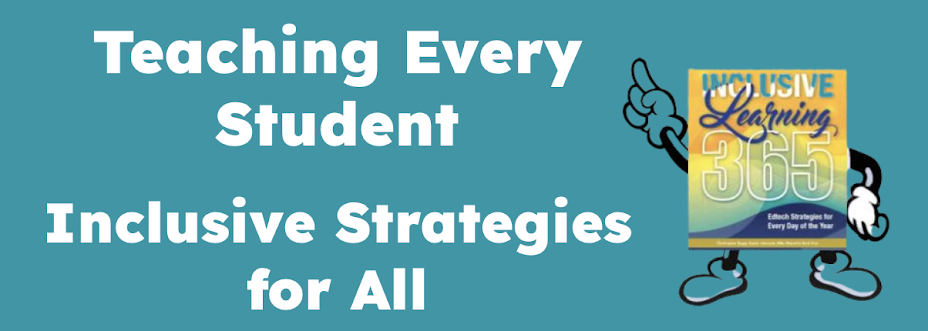Math Minute
Copying from the Board
Reading Out Loud
Paper/Pencil Tasks
Textbooks
What do these all have in common?
They present obstacles to success for students with disabilities.
Do you realize that tasks you present to your students have unintended consequences? Do you consider the fact that some students can not achieve success because you have placed obstacles before them which they can not overcome? Have you really thought about that possibility?
If not, it's time to think about the educational rationale for the instructional methods you incorporate into your teaching practice. Why do you do what you do? And what obstacles are you presenting by the choices you make?
Question everything.
Let's start with the Math Minute. During a recent IEP meeting, the issue of the Math Minute (a common practice in many classrooms) arose. A student's parents brought up the point their son was only able to complete about half of the problems on the Math Minute sheet. He completed them correctly, I should add. Nevertheless, he was graded 15/30. He was penalized due to his slow processing, which was identified during his cognitive testing. The WISC-4 provides a score for processing speed so there was no denying his difficulty. Let's question this practice. What is the educational rationale for timing students using the Math Minute? If there is a satisfactory rationale, how do we accommodate for students who are slower processors or who have physical or visual disabilities that prevent them from completing all the problems in a timed scenario?
Question everything.
Can we talk about copying from the board? What is the educational rationale for this school task? Some students have difficulty with eye gaze shifting and locating their place on the board from a distance. Other students struggle with visual processing skills. The ability to copy is one of those skills that proves nothing other than to point out which students are challenged by this task. Instead, it slows down their performance and may prevent them from achieving the point of the lesson. One example is the grammar correction task. Teachers write grammatically incorrect sentences on the board; students copy the sentences and then make corrections. Many students complete this activity without difficulty but some students only have time to copy and do not have time to make the corrections. What have they learned? Let's consider some alternatives. Provide all students with the sentences printed out in advance. Or, post the sentences to the class wiki or other resource. Show students how to use the reviewing toolbar to make corrections and then email their work to you at the end of the week. No need for paper or copying.
Question everything.
Let's tackle the subject of reading out loud, even if it's only in a small group. Have you ever noticed how some students will do whatever it takes to avoid the humiliation of reading in front of their peers? When they are so anxious about the prospect of reading, how much learning is actually occurring? Instead, give students options to record their reading using Garage Band or VoiceThread or Audacity. Kids are very aware of their reading abilities. Respect their need to avoid humiliation while providing an alternative.
Question everything.
There are many students who struggle with written output and yet we require them to use the tools and methods (paper/pencil/worksheets) that limit their success. When your students struggle with spelling despite an extensive vocabulary, when your students have great ideas but can't get them down on paper, what are you doing to promote success? Do you persist in depending upon the the "old standbys?"What alternatives have you considered? Is word prediction software available on your computer (Co:Writer 6, WordQ, Write:Online)? Have you shown students how they can use Ghotit, a free contextual spell checker that can be downloaded or used online?
Question everything you do. Question every instructional method you employ. Do your methods reach every learner? Does every choice you make in your classroom lead to success for all your students? If not, I encourage you to reflect on your practice and consider using some of the tools from the FREE UDL Tech Toolkit wiki.
Some students will need additional options and this is when you need to involve the assistive technology specialist in your district. A wealth of options exist which promote student success. Don't handicap your students by limiting the choices in your classroom.
Instead, question (your instructional methods), consider (alternatives), reflect (on your professional practice and ask, is it reaching all your learners?) and finally, accommodate (for individual learning challenges).
Tuesday, September 21, 2010
Wednesday, September 01, 2010
"An Open Letter to Special Needs Professionals"
Via twitter, I learned about a blog post written by a mother of a child with special needs. She directed it specifically to "special needs professionals." I believe all educators are "special needs professionals" and encourage you to read this heartfelt, humbling and powerful post.
Hello?
New teacher, or therapist, or doctor? Is that you?
Oh hello...
I just wanted to chat with you a second. To caution you. Or warn you.
Please, tread carefully.
You see, what you might not realize as you look at me, talk to me, tell me your opinions, our options, our lack of options, and your predictions of our outcomes is that;
well ... you see that heart? continued...
Subscribe to:
Posts (Atom)
